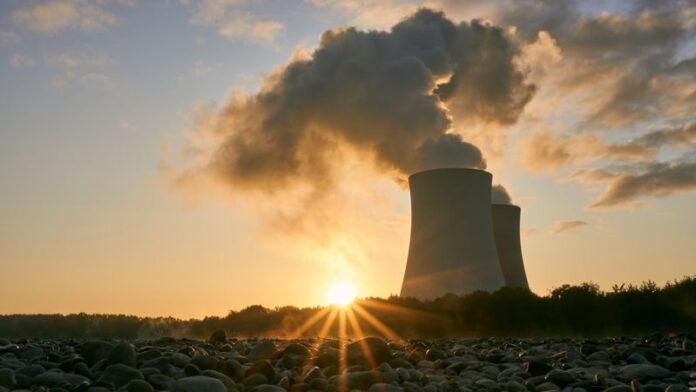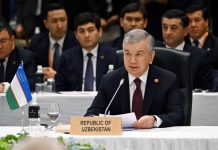By
Beyond geopolitical ramifications, there are substantial concerns that this project might disrupt the environmental equilibrium and investment climate throughout Central Asia, further exacerbating regional security tensions. One of the glaring consequences of this alliance is not merely its economic implications but the potential for Uzbekistan to be ensnared in a “strategic dependency” on Russia.
In this geopolitical chessboard, Moscow, already wielding influence through avenues like labor migration, natural gas, and petrochemical products, stands to gain control over nuclear fuel production and the upkeep of the upcoming nuclear facility.
The proposed plant’s location is by Lake Tuzkan, part of the Aydar-Arnasay lake system, a mere 40 kilometers from the Uzbekistan-Kazakhstan border. Alarmingly, Tashkent, a bustling city home to three million residents, is just 140 kilometers away. Experts have voiced concerns over the plant’s positioning without proper windrose calculations and in an earthquake hotspot, where magnitudes can range from 6.0 to 6.5 and even higher.
Furthermore, Uzbekistan’s seismic activity is widespread. Several towns, including Jizzak and settlements near the proposed plant, lie in earthquake-sensitive zones, with some tremors potentially hitting a catastrophic 9 on the Richter scale.
Some posit that the mountainous terrain would shield Uzbekistan from any airborne radioactive emissions in the event of a nuclear disaster. However, the ensuing contaminated water would invariably flow towards the Kazakh plains, infiltrating deep into the earth.
Kazakh ecologist Timur Yeleusizov articulates the anxieties many share: the consequences of potential contamination of water bodies in an accident scenario. “Seismological activity in the area of the selected NPP site raises many questions. Who will be responsible for everything that happens in the event of accidents or leaks? After all, rivers and lakes, including underground streams, will also be contaminated with toxic substances.”
Despite Central Asia’s abundant energy reserves, Uzbekistan’s reliance on Russian energy is growing. This dependency is underscored by pivotal projects like the Pskem hydroelectric plant and the upcoming nuclear facility by Rosatom, a venture pegged at roughly $11 billion. Notably, despite crippling economic sanctions against Russia, Uzbekistan’s energy trajectory remains unchanged. There’s also the question of the plant’s sustainability, especially the prospect of utilizing “dry cooling” towers, a measure to conserve water from Lake Tuzkan.
Rosatom’s claim regarding the VVER-1200 reactor’s safety post-Fukushima has been challenged by European nuclear safety experts, pointing to significant design and safety flaws. This, coupled with a lack of licensing in Western nations, raises red flags.
Despite public petitions against the nuclear power plant, spearheaded by Uzbek activist Akzam Akhmedbaev, the movement hasn’t gained significant traction. Anvarmirzo Khusainov, a former Uzbek minister turned environmentalist, opines on Russia’s strategic maneuvering in Central Asia, highlighting the long-term maintenance and security implications of such plants.
Uzbekistan also grapples with a dearth of nuclear power experts. Thus, a significant portion of the plant’s key roles might fall to Russian professionals, contrasting sharply with Kazakhstan’s rich nuclear legacy and expertise.
The contrast further deepens when considering public involvement. While Kazakhstan contemplates a national referendum on nuclear energy, Uzbekistan’s decision circumvented public consultation. This sidestepping is concerning, especially given the inherent risks and costs associated with nuclear power.
As the plant’s blueprint progresses, environmental concerns loom large, notably the potential drop in water levels in the Aydar-Arnasay lake system, crucial for cooling the reactors. Yeleusizov emphasizes the region’s acute water scarcity, arguing that water concerns overshadow energy needs and thus warrant project reconsideration.
Uzbekistan’s nuclear aspirations, set against the backdrop of Central Asia’s quest for unity and peace, present a conundrum. The presence of a Russian-backed nuclear facility amidst escalating global conflicts raises alarms. Wilder Alejandro Sánchez’s contemplative piece, “Does Uzbekistan Need a Nuclear Power Plant?” mirrors these anxieties. As the world teeters on the brink of potential nuclear calamity, the urgency to address these concerns and the associated regional ramifications cannot be understated.
Source:https://intpolicydigest.org/the-uzbek-nuclear-endeavor-boon-or-bane-for-central-asia/






